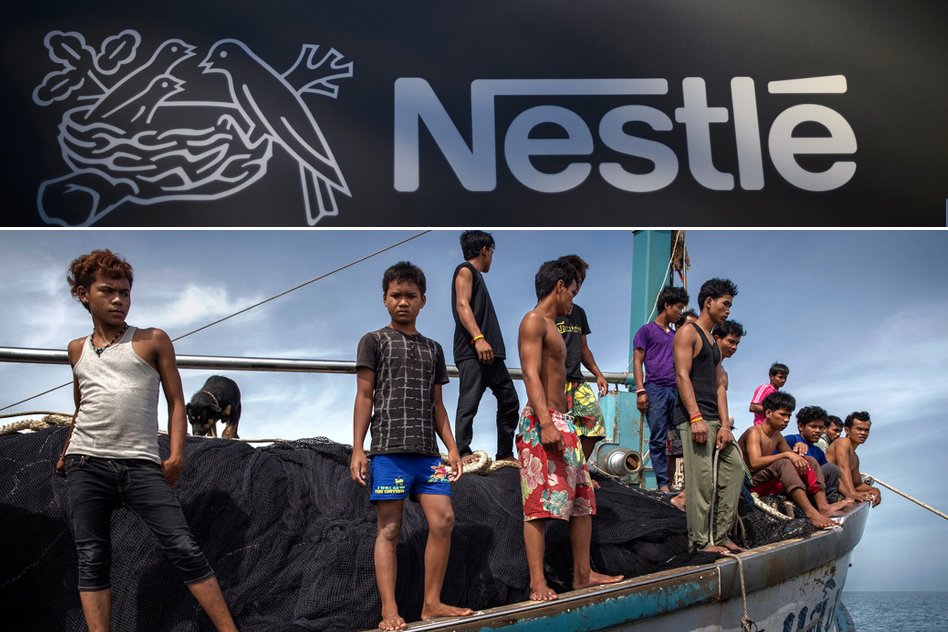
Nestlé Admits Slavery While Fighting Child Labour Lawsuit
13 Feb 2016 1:15 PM GMT
Image Courtesy: The Guardian | nyt
Slavery in Nestlé’s supply Chain from Thailand
Verité, an establishment that helps companies, and other stakeholders fully understand labor issues in their supply chain systems. Nestlé contracted Verité to conduct a three-month assessment of its shrimp supply chain in Thailand. The report, which Nestlé has made public, identified rampant usage of forced labor and other human rights abuses in its supply chain.
Slavery, Bondage & Drugs
Since late 1980’s when local workers shifted to new jobs after a typhoon destroyed the fishing industry of Thailand, migrant workers were lured to work for the fishing industry promising more money than they could ever make. Workers were subjected to deceptive recruitment processes in their home countries and eventually had to live in inhumane conditions and held in eternal bondage. They were not provided with adequate information about the terms of their work and the actual conditions of the work were very severe, including excessive overtime and no days off. There were no mechanisms for age verification and no Grievance redressal window for sea-based workers. Workers often lacked appropriate documentation, which would have lent them some level of protection against threats of detention, deportation, and denunciation to the authorities. Verité found the use of illegal substance and drugs among workers on fishing boats to be rampant and if any of them died they were just thrown off the boats.
Nestle’s Self Evaluation
What’s very unusual about this is that Nestle itself has owned up and revealed the abuse of its workers in Thailand after an internal investigation.The laborers were brought in from Myanmar, Cambodia, and Laos. All these countries are facing chronic internal disturbances and poverty and hence become vulnerable for exploitation. The internal conflict has led to outmigration of those who have been displaced and thus have ended up in Thailand’s fishing industry. Earlier there was a reveal about similar instances of abuse related to Nestles Fancy Cat food product. Some have criticized this move of Nestle as they only came out when they have been under investigation for a year on charges of human rights abuse. Andrew Wallis, chief executive of Unseen UK said that Nestlé’s self-reporting could also be seen as a tactic to head off or deflate other pending civil litigation suits. However, the disclosure was considered by many to be ground-breaking. Nick Grono, the chief executive of NGO the Freedom Fund said: “Nestlé’s decision to conduct this investigation is to be applauded”. Grono said that Nestle is one of the biggest brand in the world and if they have admitted slavery in their business operations then they need to be applauded. This new found self-policing and supply chain accountability is fit to be a benchmark for further disclosures in other industries as well.
Curbing Slavery
For its study, Verité interviewed more than 100 people, including about 80 workers from Myanmar and Cambodia, as well as boat owners, shrimp farm owners, site supervisors and representatives of Nestlé ‘s suppliers. About 2000 workers have already been saved and rescued by authorities after reports started to make media headlines in Thailand last year. Nestle is admitting to slavery in Thailand when it is battling child labor lawsuits in Ivory Coast. The company may or may not have won acclaim for its admission of forced labor in the Thai seafood industry but the truth is much of the supply chain remains hidden even now. The outcome of the child labor lawsuit is still pending. Admitting that the consumers have been buying products that have been tainted by blood and sweat of migrant laborers in Thailand is bound to attract controversy. Thailand is a source, transit, and destination country for men, women, and children trafficked for the purposes of forced labor and commercial sexual exploitation. As Thailand’s fishing sector faces criticism, fishermen are now shifting to trafficking, converting their boats to carry people and facilitating huge off-shore trafficking camps.
The Logical Indian community is as shocked as anyone on the revelations. We request all the corporates in this industry to replicate Nestle’s process and purge their supply chains of slavery and human rights abuse.
-Sanwal Chandra
 All section
All section













